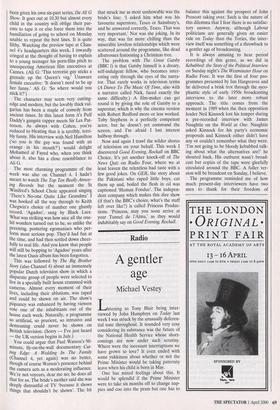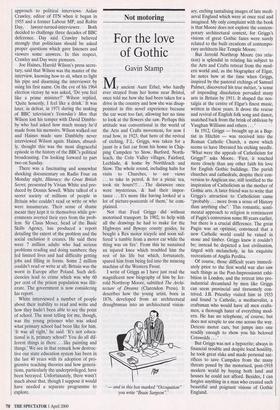Radio
A gentler age
Michael Vestey
Listening to Tony Blair being inter- viewed by John Humphrys on Today last week I was struck by the unusually deferen- tial tone throughout. It sounded very cosy considering its substance was the future of the National Health Service whose short- comings are now under such scrutiny. Where were the incessant interruptions we have grown to love? It even ended with some yukkiness about whether or not the Prime Minister would be taking paternity leave when his child is born in May.
One has mixed feelings about this. It would be splendid if the Prime Minister were to take six months off to change nap- pies and coo into the pram but one has to balance this against the prospect of John Prescott taking over. Such is the nature of this dilemma that I fear there is no satisfac- tory answer. Anyway, although Labour politicians are generally given an easier ride on Today than the Tories, the inter- view itself was something of a throwback to a gentler age of broadcasting.
It is always amusing to hear period recordings of this genre, as we did in Kebabbed:• the Story of the Political Interview on Sunday night's The Westminster Hour on Radio Four. It was the first of four pro- grammes presented by Ian Hargreaves and he delivered a brisk trot through the syco- phantic style of early 1950s broadcasting interviews to the later more robust approach. The title comes from the moment in 1989 when the then opposition leader Neil Kinnock lost his temper during a pre-recorded interview with James Naughtie on the World at One. Naughtie asked Kinnock for his party's economic proposals and Kinnock either didn't have any or couldn't remember what they were. `I'm not going to be bloody kebabbed talk- ing about what the alternatives are!' he shouted back. His outburst wasn't broad- cast but copies of the tape were gleefully circulated around the BBC. A fuller ver- sion will be broadcast on Sunday, I believe.
The programme reminded me of how much present-day interviewers have two men to thank for their freedom of approach to political interviews: Aidan Crawley, editor of ITN when it began in 1955 and a former Labour MP, and Robin Day, lawyer-turned-interviewer. Both decided to challenge three decades of BBC deference. Day said Crawley believed strongly that politicians should be asked proper questions which gave listeners and viewers some answers. In this respect, Crawley and Day were pioneers.
Joe Haines, Harold Wilson's press secre- tary, said that Wilson was the master of the interview, knowing how to sit, when to light his pipe and disarming the interviewer by using his first name. On the eve of his 1964 election victory he was asked, `Do you feel like a prime minister?' Wilson replied, `Quite honestly, I feel like a drink.' It was later, in defeat, in 1971 during the making of BBC television's Yesterday's Men that Wilson lost his temper with David Dimble- by who had asked how much money he'd made from his memoirs. Wilson walked out and Haines made sure Dimbleby never interviewed Wilson again. Haines, absurd- ly, thought this was the most disgraceful episode in the history of the BBC's political broadcasting. I'm looking forward to part two on Sunday.
There was a fascinating and somewhat shocking documentary on Radio Four on Monday night, Illiteracy: the Great British Secret, presented by Vivian White and pro- duced by Dennis Sewell. White talked of a secret society of millions of people in Britain who couldn't read or write or who were innumerate. Their sense of shame meant they kept it to themselves while gov- ernments averted their eyes from the prob- lem. Sir Claus Moser, head of the Basic Skills Agency, has produced a report detailing the extent of the problem and the social exclusion it creates. He said there were 7 million adults who had serious problems reading and doing numbers; they led limited lives and had difficulty getting jobs and filling in forms. Some 2 million couldn't read or write at all; Britain was the worst in Europe after Poland. Such defi- ciencies lead to crime which was why 60 per cent of the prison population was illit- erate. The government is now considering his report.
White interviewed a number of people about their inability to read and write and how they hadn't been able to see the point of school. The most telling for me, though, was the young prisoner who was asked what primary school had been like for him. `It was all right,' he said. `It's not educa- tional is it, primary school? You do all dif- ferent things in there ... like painting and things.' We see in that remark how destruc- tive our state education system has been in the last 40 years with its adoption of pro- gressive teaching theories and how genera- tions, particularly the underprivileged, have been betrayed. Unfortunately, there wasn't much about that, though I suppose it would have needed a separate programme to explore.























































































 Previous page
Previous page